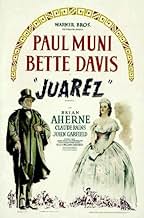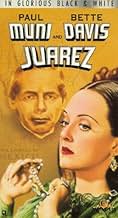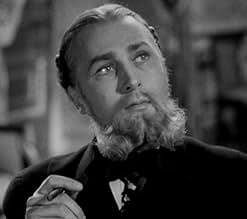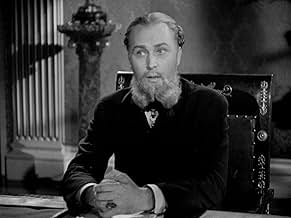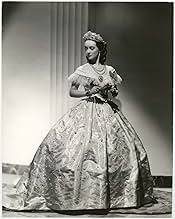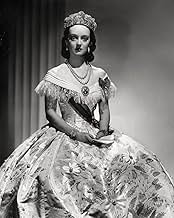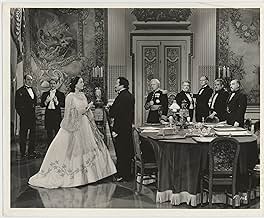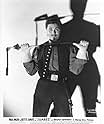अपनी भाषा में प्लॉट जोड़ेंLouis Napoleon III (Claude Rains) takes advantage of the American Civil War to circumvent the Monroe Doctrine and expand his power by helping Emperor Maximilian von Habsburg (Brian Aherne) t... सभी पढ़ेंLouis Napoleon III (Claude Rains) takes advantage of the American Civil War to circumvent the Monroe Doctrine and expand his power by helping Emperor Maximilian von Habsburg (Brian Aherne) to add Mexico to his empire.Louis Napoleon III (Claude Rains) takes advantage of the American Civil War to circumvent the Monroe Doctrine and expand his power by helping Emperor Maximilian von Habsburg (Brian Aherne) to add Mexico to his empire.
- 1 ऑस्कर के लिए नामांकित
- 3 जीत और कुल 1 नामांकन
फ़ीचर्ड समीक्षाएं
Benito Juarez who rose from being an illiterate Zapotec Indian from Oaxaca province in Mexico has developed into the Mexican statesman with the biggest popular appeal in American culture. Note how in the film, he is juxtaposed with Abraham Lincoln. Both men started from very humble background and rose to lead their respective nations at the same time, in times of great crises for their countries.
Paul Muni makes an impassive and stoic Juarez. It certainly is atypical of the rest of his historical characters be it Louis Pasteur, Pierre Radisson, or Emile Zola where he is quite eloquent. It's so different than what you normally see from Muni.
Juarez's story shares the screen with that of his counterpart the Emperor Maximilian. The real Maximilian was not as naive as Brian Aherne would have us believe. He knew very well his power was there while the French army was there. Yet in his own way with limited options he tried to govern as best he could. Aherne was nominated for Best Supporting Actor, but lost to Thomas Mitchell for Stagecoach.
Hollywood usually can't resist a mad act and Bette Davis might have been nominated herself had she not been already nominated for the much better Dark Victory. It really did happen that way, the high strung Carlotta just snapped when she returned to France to get help for her beleaguered husband. She lived in her private mad world for over 60 years, dying in the mid twenties of the next century.
Claude Rains registers well as emperor Louis Napoleon and with this film played both Bonaparte emperors of France. He had played the first Napoleon in Hearts Divided. Marshal Achille Bazaine played well by Donald Crisp was withdrawn with his troops because France was very concerned, rightly so, about a growing threat from a uniting Germany and couldn't waste time with imperialist ventures. I do love the fact that the French seem so concerned about the Monroe Doctrine which was nothing more than an expression of U.S. policy, always has and always will be. It had no force of law behind it, but with the Civil War over and the Union Army at the point of Appomattox being the largest army in the world at that time, that had more to do with Napoleon deciding that the western hemisphere wasn't worth it.
An interesting side note to that retrenchment policy, Louis Napoleon also withdrew French troops from Rome and the Papal States for the same reason at the same time because of threats to the home land. It removed the last block to a uniting Italy as well.
If I have a favorite among the supporting cast it is Joseph Calleia who plays Juarez's slippery Vice President who tries a palace coup d'etat and falls very short.
The one jarring note in the cast is John Garfield who sounds more like he's from the Lower East Side of New York than Mexican as Juarez supporter and future dictator of Mexico, Porfirio Diaz.
Juarez as a film is overly ambitious, it tries to tell too much in the running time allotted. A film about Juarez and a film strictly from the Maximilian/Carlotta point of view would have been far better.
JUAREZ was a possible exception, in that it was to chronicle the odd events of 1862 - 1867 when (in the shadow of the American Civil War, and the temporary inability of the U.S. Government to exercise the Monroe Doctrine)Emperor Napoleon III decided to set up a puppet Hapsburg Emperor, Archduke Maximillian to rule Mexico. The film is supposed to be centered on Benito Juarez, Mexico's greatest liberal and President (his closest 20th Century counterpart is Lazaro Cardenas, who tried to get real land reform into the country). The film shows how Napoleon's scheme unravelled due to Juarez's refusal to accept the French occupation (an early version of the Vietnam War drained French troop strength for five years), as well as the returning threat of American intervention after Lee's defeat in 1865. But worst of all was the choice of the puppet. Maximillian was one of history's dreamers - he believed in the responsibility of royalty to govern for their people, and he was (for a Hapsburg) a liberal. The result was that the scheme was doomed from the start.
The real heart of the film is the competition between Juarez and Maximillian for the hearts of Mexico - both presenting conflicting views of government (but, ironically enough, good government). Because he was a foreigner, tainted by the French army supporting him, Max lost, and he ended up shot by a firing squad (he refused an opportunity to flee). His beloved wife Carlotta (Bette Davis in the film) went insane - dying in 1927 in Belgium, some sixty years after he died). Played by Brian Ahearn, Maximillian is a sympathetic man who pursues a tragic view of duty to it's sad conclusion. Davis shows the intense love of the doomed wife of this doomed man.
The problem is Muni. His performance is stiff, but good - especially when he explains democracy to his leading "Hotspur" military supporter -a young Porfirio Diaz (John Garfield). Garfield, having gotten to know Ahearn is a good guy, tries to convince Muni to join forces (becoming the first minister to the Constitutionally minded Ahearn). Muni rejects it - why have a monarchy at all. But Muni is overlooking the finer shadings of his rival's personality - he isn't Napoleon III but Maximillian. This should have been the center of the film - but it ended on the cutting room floor. The film was too long, and so Muni is shown struggling alone, leading his guerrilla war against the invader, and fighting an unscrupulous attempt by his Vice President to overthrow him (a properly corrupt Joseph Calliea). The conflict between constitutional monarch and democratic leader is skirted. Garfield, by the way, is not so bad as Diaz - he actually was to play a stronger part had the film not been cut - he would have been confronting the aging Juarez at the end (as historically he did) as the dictator of the future who ruled Mexico for 30 years, and gave it more stability and economic growth than any other leader in it's history (while selling the country off to American and European investors). The film was supposed to end on a more sour note. If it had, it would have been a great film.
The film is historically correct and that is part of the problem. The filmmakers put every incident that led to the fall of Maximillian into the story and the film drags on and on. It's more information that we need to know.
There are mixed opinions on the Bette Davis portrayal of Empress Carlotta, the unstable wife of Maximillian. Hers is an interesting story but Davis may not have put enough incipient madness into her characterization.
On the whole,this is a pretty good history lesson with no Hollywood happy ending tacked on, that tells of a well meaning, gentle man who was badly used by the French emperor, sent to rule a people of whom he knew nothing, in a land where he was not wanted. And Aherne absolutely is perfect for the part.....he is the star of this film.
क्या आपको पता है
- ट्रिवियाBecause the film shows a number of Maximilian's generals to be Mexican, many viewers attribute it to typical Hollywood historical distortions. It is, however, indeed accurate. It's a little-known fact that, although Maximilian was eventually overthrown and executed by Mexican revolutionaries, there were more Mexicans fighting on Maximilian's side than against him. This was due in large part to the Catholic Church's strong support of the French occupation of Mexico and its encouraging of Mexican Catholics to fight against the revolutionary forces by joining Maximilian's army, which they did in large numbers.
- गूफ़When Napoleon III is informed in a letter that Robert E. Lee has been defeated at Gettysburg, he responds by paraphrasing Lincoln's famous Gettysburg Address by calling democracy as government for the people, by the people, etc. He couldn't have known Lincoln's speech flourish because it wasn't given until November 19, 1863, more than four months after the battle.
- भाव
Emperor Louis Napoleon III: Democracy! Government of the cattle, by the cattle, for the cattle!
- इसके अलावा अन्य वर्जनIn 1952, the film was re-released and several key scenes were removed, particularly sequences that contained dialogue that criticized countries which, in 1939 had been regarded as totalitarian, but which, by the early 1950s had become Cold War allies of the United States and could therefore no longer be criticized as imperialist adventurers. Germany and Italy, especially, former enemies in the 1940s, were now the cornerstone of NATO. The removal of these scenes obfuscated the narrative considerably, in particular, removing any clear reasons behind the execution of the Emperor Maximilian at the conclusion of the film. This revised print runs 106 minutes and is the version released on video and generally available today. The 1939 version is preserved on nitrate stock in the Warner Archive.
- कनेक्शनFeatured in Hollywood and the Stars: The Angry Screen (1964)
- साउंडट्रैकMy Country Tis of Thee
(uncredited)
Music attributed to Henry Carey (1744)
Played as part of the score when America is mentioned
टॉप पसंद
- How long is Juarez?Alexa द्वारा संचालित
विवरण
- रिलीज़ की तारीख़
- कंट्री ऑफ़ ओरिजिन
- भाषाएं
- इस रूप में भी जाना जाता है
- Maximilian and Carlotta
- फ़िल्माने की जगहें
- Warner Ranch, कैलाबास, कैलिफोर्निया, अमेरिका(Photographs)
- उत्पादन कंपनी
- IMDbPro पर और कंपनी क्रेडिट देखें
- चलने की अवधि
- 2 घं 5 मि(125 min)
- रंग
- ध्वनि मिश्रण
- पक्ष अनुपात
- 1.37 : 1


